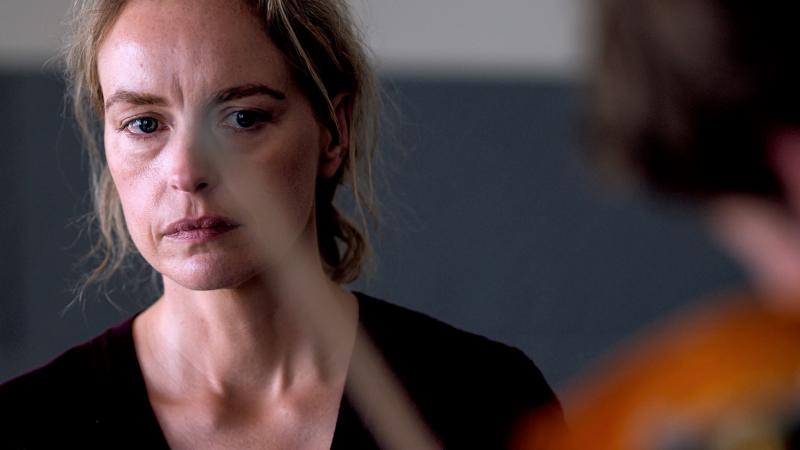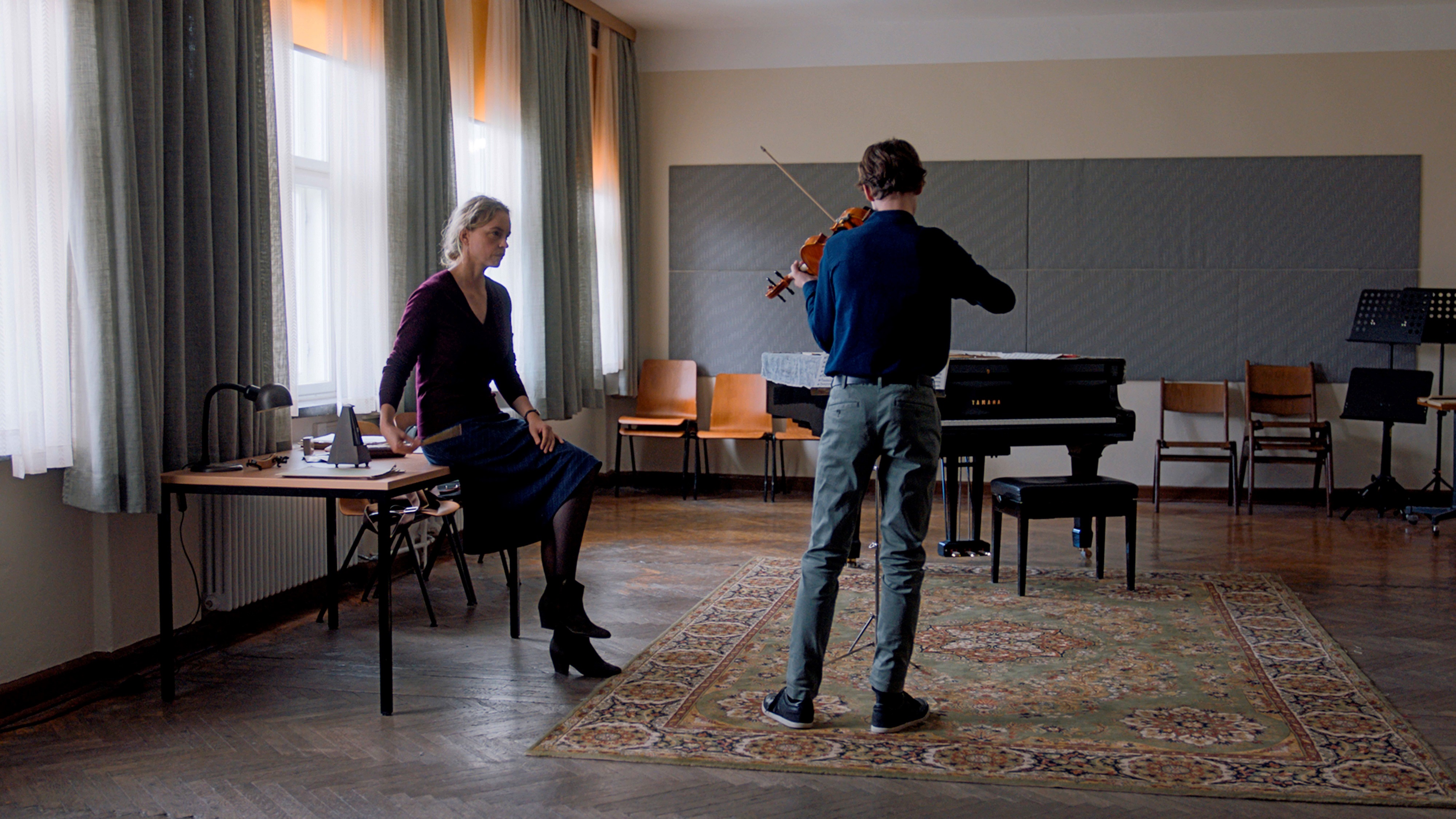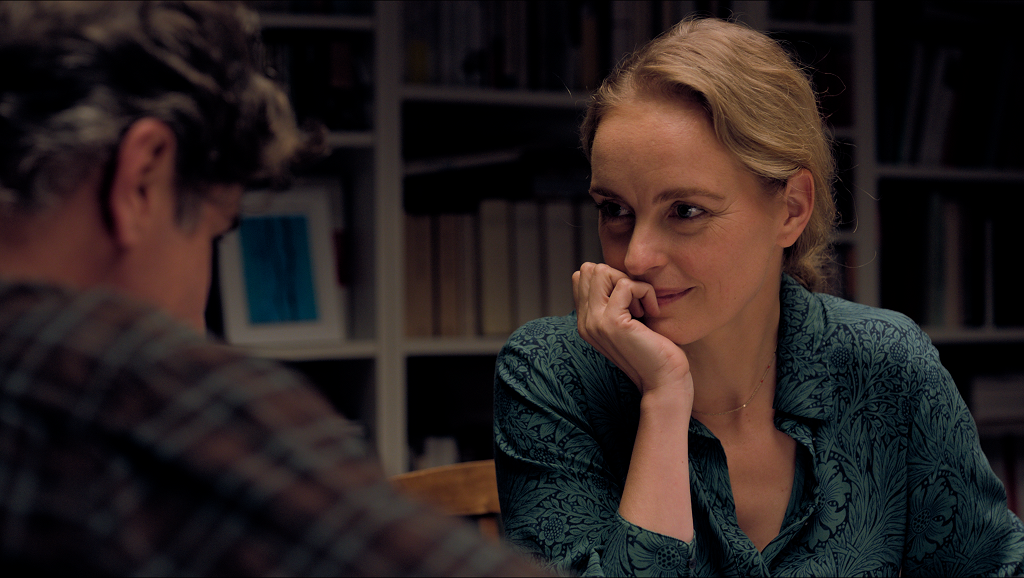The Audition review - love and hate at music school | reviews, news & interviews
The Audition review - love and hate at music school
The Audition review - love and hate at music school
Nina Hoss gives humane warmth to a tortured violin teacher

If Roman Polanski had directed Whiplash, something like this study of music’s psychological cost might have resulted. Ina Weisse’s film is more incremental and naturalistic, as violin teacher Anna (Nina Hoss) gives special attention to teenage protégé Alexander (Ilja Monti), to the jealous resentment of son Jonas (Serafin Mishiev), while nervously returning to the stage herself.
Weisse starts with tableaus of music work at Anna’s Berlin conservatoire. When camera and characters get close-up, the trouble – and, sometimes, loving connection – starts. Because music is in Anna’s family’s bones, the skeleton of their day. Her French luthier husband Philippe (Simon Abkarian) strums and murmurs a Communard anthem on her birthday, in prelude to a kiss, and bonds with Jonas over instruments’ skin-like textures. When Anna plays a Menuhin album she loves to Alexander, it’s an intimate act. Even her affair with a colleague leads to joining his string quintet. “The violin is only a tiny bit of life,” Philippe pleads. “I’m not fooling myself,” she snarls back, as if mere instrument-making is a loser’s game. To Anna music is a war she can’t win, a tortured servitude, her source of mastery and abnegation. Michael Haneke’s The Piano Teacher (2001) and Denis Dercout’s The Page Turner (2006) similarly centred on pianistic cruelty. One might also think of James Mason’s cane whacking near Ann Todd’s fingers on the piano in The Seventh Veil (1946), an early example of virtuosity’s sadomasochistic undercurrents. Weisse and co-writer Daphne Charizani have both played in string sections, experiencing their “often excruciating” practice regimes. The Audition doesn’t exalt this into the mad militaristic melodrama of Whiplash, or see music as explosive genius. Instead, Weisse soberly observes its quotidian making: the office politics of bitchy colleagues, and bus rides to work as the seasons change, building Anna’s Berlin world.
Michael Haneke’s The Piano Teacher (2001) and Denis Dercout’s The Page Turner (2006) similarly centred on pianistic cruelty. One might also think of James Mason’s cane whacking near Ann Todd’s fingers on the piano in The Seventh Veil (1946), an early example of virtuosity’s sadomasochistic undercurrents. Weisse and co-writer Daphne Charizani have both played in string sections, experiencing their “often excruciating” practice regimes. The Audition doesn’t exalt this into the mad militaristic melodrama of Whiplash, or see music as explosive genius. Instead, Weisse soberly observes its quotidian making: the office politics of bitchy colleagues, and bus rides to work as the seasons change, building Anna’s Berlin world. Hoss was acting muse to Christian Petzold, carving intense feeling into German social parables such as Barbara (2012) and Phoenix (2014). Her humane performance here gives a warm blush to what could be a chilly portrait. Anna is often kind and loving to her son, shielding him from her disciplinarian dad. Her flaws crawl just under the surface, feeding bottomless doubts in her ability to match lofty musical ideals. She means well, and is self-aware enough to mostly quell her tremulous inner nature. But when she’s lured into testing her own adequacy in concert, the excruciating result is bad news for Alexander. He’s already appeared at her home, a cuckoo in the nest and rival to Jonas. Now Anna’s methods go from rigorous to monomaniacally inappropriate, his face flushing as she grabs his recalcitrant body. His audition becomes a crucible for all her hopes.
Hoss was acting muse to Christian Petzold, carving intense feeling into German social parables such as Barbara (2012) and Phoenix (2014). Her humane performance here gives a warm blush to what could be a chilly portrait. Anna is often kind and loving to her son, shielding him from her disciplinarian dad. Her flaws crawl just under the surface, feeding bottomless doubts in her ability to match lofty musical ideals. She means well, and is self-aware enough to mostly quell her tremulous inner nature. But when she’s lured into testing her own adequacy in concert, the excruciating result is bad news for Alexander. He’s already appeared at her home, a cuckoo in the nest and rival to Jonas. Now Anna’s methods go from rigorous to monomaniacally inappropriate, his face flushing as she grabs his recalcitrant body. His audition becomes a crucible for all her hopes.
Excepting Anna’s dad with his Prussian manners, Weisse’s characters aren’t bad, yet prove capable of doing very bad things, as becomes all too clear with the final, monstrously jolting act of this sympathetic and sinister character study.
rating
Explore topics
Share this article
The future of Arts Journalism
You can stop theartsdesk.com closing!
We urgently need financing to survive. Our fundraising drive has thus far raised £49,000 but we need to reach £100,000 or we will be forced to close. Please contribute here: https://gofund.me/c3f6033d
And if you can forward this information to anyone who might assist, we’d be grateful.

Subscribe to theartsdesk.com
Thank you for continuing to read our work on theartsdesk.com. For unlimited access to every article in its entirety, including our archive of more than 15,000 pieces, we're asking for £5 per month or £40 per year. We feel it's a very good deal, and hope you do too.
To take a subscription now simply click here.
And if you're looking for that extra gift for a friend or family member, why not treat them to a theartsdesk.com gift subscription?
more Film
 Steve review - educator in crisis
Cillian Murphy excels as a troubled headmaster working with delinquent boys
Steve review - educator in crisis
Cillian Murphy excels as a troubled headmaster working with delinquent boys
 Can I get a Witness? review - time to die before you get old
Ann Marie Fleming directs Sandra Oh in dystopian fantasy that fails to ignite
Can I get a Witness? review - time to die before you get old
Ann Marie Fleming directs Sandra Oh in dystopian fantasy that fails to ignite
 Happyend review - the kids are never alright
In this futuristic blackboard jungle everything is a bit too manicured
Happyend review - the kids are never alright
In this futuristic blackboard jungle everything is a bit too manicured
 Robert Redford (1936-2025)
The star was more admired within the screen trade than by the critics
Robert Redford (1936-2025)
The star was more admired within the screen trade than by the critics
 Blu-ray: The Sons of Great Bear
DEFA's first 'Red Western': a revisionist take on colonial expansion
Blu-ray: The Sons of Great Bear
DEFA's first 'Red Western': a revisionist take on colonial expansion
 Spinal Tap II: The End Continues review - comedy rock band fails to revive past glories
Belated satirical sequel runs out of gas
Spinal Tap II: The End Continues review - comedy rock band fails to revive past glories
Belated satirical sequel runs out of gas
 Downton Abbey: The Grand Finale review - an attemptedly elegiac final chapter haunted by its past
Noel Coward is a welcome visitor to the insular world of the hit series
Downton Abbey: The Grand Finale review - an attemptedly elegiac final chapter haunted by its past
Noel Coward is a welcome visitor to the insular world of the hit series
 Islands review - sunshine noir serves an ace
Sam Riley is the holiday resort tennis pro in over his head
Islands review - sunshine noir serves an ace
Sam Riley is the holiday resort tennis pro in over his head
 theartsdesk Q&A: actor Sam Riley on playing a washed-up loner in the thriller 'Islands'
The actor discusses his love of self-destructive characters and the problem with fame
theartsdesk Q&A: actor Sam Riley on playing a washed-up loner in the thriller 'Islands'
The actor discusses his love of self-destructive characters and the problem with fame
 Honey Don’t! review - film noir in the bright sun
A Coen brother with a blood-simple gumshoe caper
Honey Don’t! review - film noir in the bright sun
A Coen brother with a blood-simple gumshoe caper
 The Courageous review - Ophélia Kolb excels as a single mother on the edge
Jasmin Gordon's directorial debut features strong performances but leaves too much unexplained
The Courageous review - Ophélia Kolb excels as a single mother on the edge
Jasmin Gordon's directorial debut features strong performances but leaves too much unexplained

Add comment